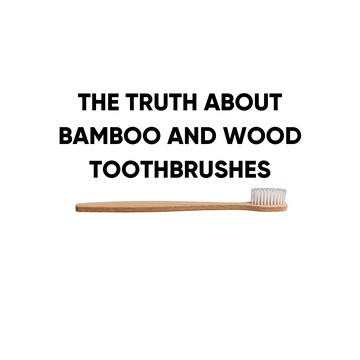Can They Damage Your Oral Health?
In recent years, there has been a growing popularity of eco-friendly toothbrushes made from bamboo or wood. Although the environmental benefits are undeniable, it is essential to carefully assess whether these materials truly represent the best choice for maintaining optimal oral health. In this article, we will explore the potential drawbacks of bamboo and wooden toothbrushes and introduce a superior alternative – the promis toothbrush made of lignin.


Bamboo Toothbrushes vs. promis brushes
Absence of Antimicrobial Properties: A significant disadvantage of bamboo and wooden toothbrushes is their inability to effectively resist microbial growth. Traditional plastic toothbrushes often incorporate antimicrobial agents, providing an additional layer of protection against harmful bacteria. Unfortunately, bamboo and wood do not have intrinsic antimicrobial properties, potentially compromising oral hygiene.
Moisture Absorption and Mold Growth: Wooden materials tend to absorb moisture, creating an environment conducive to the growth of mold and bacteria. This not only poses a potential health risk but also shortens the lifespan of the toothbrush. Over time, a compromised toothbrush may become less effective in keeping the mouth clean and healthy.
Quality and Wear of the Bristles: While bamboo and wooden toothbrushes boast sustainability, the quality of the bristles can vary significantly. Some may be too abrasive and pointed, potentially leading to inadequate Plaque removal or gum irritation. Additionally, bristle wear may occur more quickly compared to their synthetic counterparts.
Environmental Impact of Production: Surprisingly, the environmental impact of producing bamboo toothbrushes is not as straightforward as it seems. The process of harvesting and manufacturing bamboo involves extensive consumption of water and energy. Additionally, transporting bamboo products over long distances can contribute to the overall carbon footprint.
The Alternative: the promis Toothbrush in Lignin

In light of the limitations associated with bamboo and wooden toothbrushes, it is crucial to explore alternatives that prioritize both sustainability and oral health. The promis toothbrush stands out as a revolutionary toothbrush made from lignin, a natural polymer derived from wood. Here’s why it is the superior choice:
Antimicrobial Properties: La lignin naturally possesses antimicrobial properties, ensuring that your toothbrush remains a hostile environment for harmful bacteria.
Humidity Resistance: Unlike traditional wood, lignin is resistant to moisture absorption, reducing the risk of mold and bacterial growth.
Optimal Bristle Quality: The promis toothbrush uses high-quality PBT bristles, striking the perfect balance between effectiveness and gentleness on teeth and gums.
Sustainable Production: Lignin is a by-product of the paper and pulp industry, ensuring that the production of the promis toothbrush minimizes waste and uses materials that would otherwise be discarded.
Make the Switch for a Healthier and More Sustainable Smile In conclusion, while bamboo and wooden toothbrushes have gained popularity for their eco-friendly appeal, they may compromise your oral health in the long term.
The promis toothbrush made from lignin stands out as a superior alternative, providing both sustainability and optimal oral care. Make the switch today and embrace a toothbrush that cares for your smile and the planet at the same time.


